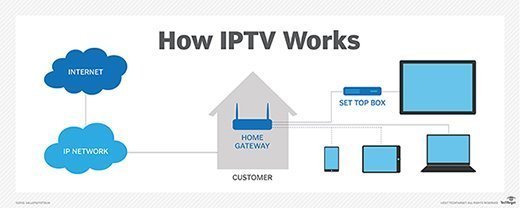IPTV (Internet Protocol television)
What is IPTV (Internet Protocol television)?
IPTV (Internet Protocol television) is a service that provides television programming and other video content using the Transmission Control Protocol/Internet Protocol (TCP/IP) suite, as opposed to broadcast TV, cable TV or satellite signals.
An IPTV service, typically distributed by a service provider, delivers live TV programs or on-demand video content via IP networks.
An IPTV system may be used to provide video content over a private network in an enterprise, although such implementations are far less common than subscriber-based models due to the complexity, network latency and scaling issues.
How does Internet Protocol television work?
IPTV content is often delivered over a managed or dedicated network, like Digital Subscriber Line connectivity. Compared to the public internet, a private network gives network operators more control over the video traffic and, by extension, the ability to ensure quality of service, uptime, bandwidth and reliability.
In traditional television delivery, all programming is broadcast simultaneously in a Multicast format. The available program signals flow downstream, and viewers select programs by changing the TV channel.
An IPTV service, by contrast, sends only one program at a time, i.e., a unicast format. Content remains on the internet service provider's network, and only the program the end user selects is sent to the user's device.
When a viewer changes the channel, a new stream is transmitted from the provider's server directly to the viewer. Like cable television, IPTV requires a set-top box or other customer premises devices, such as a Wi-Fi router or a fiber optic or broadband internet connection.
IPTV primarily uses IP multicasting with Internet Group Management Protocol for IPv4-based live television broadcasts and Real-Time Streaming Protocol for on-demand programs. Multicast Listener Discovery is used on IPv6 networks. Other common protocols include Real-Time Messaging Protocol and Hypertext Transfer Protocol.

What are IPTV use cases?
Because IPTV uses a packet-based delivery system, it can be bundled with other IP-based telecommunication services, such as voice over IP and high-speed internet.
The use of IP also enables providers to support various other services and applications, such as video on demand, interactive TV, livestreaming, in-program messaging and time shifting, a broad term for TV services that enable viewers to consume content in ways other than live broadcasts, e.g., digital recording, on-demand television shows and the ability to rewind or restart a live program already in progress.
IPTV competes with another delivery model known as internet TV, which refers to television content distributed through a website via a broadband connection.
IPTV providers
IPTV providers include a wide range of companies from large network operators, like Verizon with its FIOS video services, and major companies, such as Netflix, Google, Apple and Microsoft, to Sony, which also offers video streaming services via smart TV sets and internet-enabled devices, and AT&T. Additional examples of major IPTV providers include Roku, Hulu and YouTube. Some other popular IPTV services include Amazing TV, FalconTV, SelectTV, Best Cast TV, Comstar.tv and Xtreme HD IPTV.
Providers of IPTV also include a wide variety of smaller or niche companies sometimes specializing in certain types of content delivered over a broadband IP connection. Here's a sampling of some additional ITPV offerings:
- Apollo Group TV
- Bing TV
- Decoded Streams
- Hoopla
- Hotstar
- HUTV
- Iconic Streams
- IMDb TV
- IPTVGang
- IPTV Trends
- Kanopy
- King TV
- Kodi
- The Matrix IPTV
- Necro IPTV
- nVision TV
- Perfect Player
- Players Klub IPTV
- Popcornflix
- RocketStreams
- Snap.tv
- Sportz TV
- Tubi
- Vudu
- YeahIPTV






